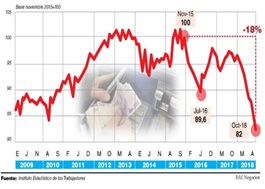Salary and quality of life of the workers of the Commune La Candelaria Medellin
DOI:
https://doi.org/10.17981/econcuc.40.2.2019.06Keywords:
Actual salary, Quality of, life, Confecciones, CommuneAbstract
Variations in wages have always been considered one of the biggest concerns of workers, without them stopping to think about purchasing power as a guarantee for a better quality of life, despite the fact that there are several indicators that address this aspect, such as the human development index, which takes into account education, housing, health, etc. This investigation focused its analysis on income as a fundamental element of this condition to answer the hypothesis raised: “80% of the workers in the activity of clothing in strata 2 and 3 of commune 10 of the city of Medellín (La Candelaria), they work in informal employment, with a low salary that does not allow them to have a good quality of life. ” The method that was used for the development of this investigation includes qualitative and quantitative methodological aspects. In a first phase, a bibliographic and documentary tour is carried out, and in a second phase, it was necessary to take into account the statistical data collection through a survey to verify the hypothesis initially proposed. Some of the results show that to obtain a good standard of living it is necessary for other members of the household to make their contribution. It was concluded that the workers' salary is a key variable that allows workers in the clothing industry to have a good quality of life.
Downloads
References
Ardila, R. (2003). Calidad de vida: una definición integradora. Revista latinoamericana de psicología, 35(2), 161–164.
Atehortúa, M. (2006). Manual de legislación laboral. Mexico, D.F.: Nuevo Milenio.
Beker, V. (2011). La teoría macroeconómica y la crisis. Revista de la Facultad de Ciencias Económicas-Chaco-Argentina, 7(1), 21–37. http://dx.doi.org/10.30972/rfce.071157
Bonilla, M. G. (1996). Salarios, precios y productividad. Una relación siempre cambiante. Bogotá D.C.: Fescol.
Bonilla, E., Cardeño, E. & Cardeño, N. (2015). La función financiera en las micros, pequeñas y medianas empresas, del municipio de Riohacha. Económicas CUC, 36(2), 137–146.
Caldas, T. y Triana, F. (1957). Régimen Laboral Colombiano. Bogotá D.C.: Legis.
Cámara de Comercio de Medellín. (2019). Caracterización económica y empresarial de la comuna 10 la Candelaria. Revista Antioqueña de Economía y Desarrollo. RAED, 21, 8–103.
Casas, J. (2017). Implicaciones de los acuerdos del Fondo Monetario Internacional sobre la pobreza en Colombia. Económicas CUC, 38(1), 9–36. http://dx.doi.org/10.17981/econcuc.38.1.01
Castaño, J., Montoya, L. & Restrepo, L. (2009). Compensacion salarial y calidad de vida. Scientia et Technica, 15 (43), 89–94
Campbell, U. y Barraza, J. (2015). La crítica de la teoría del valor en Marx, Sraffa y Keynes: un complemento conceptual para la economía. Nicolaita de Estudios Económicos, 10(1), 53–70.
Chumaceiro, A., Hernández, J. y Chirinos, E. (2016). Responsabilidad social universitaria, desarrollo sostenible y ciudadanía ambiental. Cuadernos de RSO, 4(1), 53–64. Disponible en https://ucu.edu.uy/sites/default/files/facultad/fce/rso/cuadernos-de-rso-vol-4-n1-chumaceiro.pdf
Galván, M. (2017). ¿Qué es calidad de vida? Logos Boletín Científico de la Escuela Preparatoria, 1(2). [Online]. Disponible en https://www.uaeh.edu.mx/scige/boletin/prepa2/n2/m2.html
Galvis, J. y Romero, A. (2014). Salario mínimo legal y salario real: estudio de caso para el eje cafetero. Gestión y región, (17), 19–38.
Graña, J., y Kennedy, D. (2008). Salario real, costo laboral y productividad Argentina 1947–2006. Documentos de trabajo, (12), 1–40. Disponible en http://209.177.156.169/libreria_cm/archivos/pdf_981.pdf
Hernández, J. y Chumaceiro, A. (2018). Acercamiento histórico a la participación ciudadana en Venezuela modelo de relación Estado-Sociedad (1958-2012). Revista de Ciencias Sociales-RCS, 24(2), 56–67
Hernández, J., Chumaceiro, A. Ziritt, G. y Acurero, M. (2018). Cultura para la paz en Colombia. Una aproximación desde las políticas públicas. Opción, 34(86), 612–641
Keynes, J. (1965). Teoría general de la ocupación, el interés y el dinero. México, D.F.: Fondo de Cultura Económica.
Kornblihtt, J., Seiffer, T. y Villanova, N. (2014). De la caída relativa a la caída absoluta del salario real en Argentina. Guillermo de Ockham, 12(2), 41–50.
Pérez, M. E., Hernández, J., Acosta, I. y Chumaceiro, A. (2009). Consideraciones teóricas para el análisis de las Pequeñas y Medianas Empresas como fuente de generación de empleo y su correspondencia ética con la Sociedad. Revista de Formación Gerencial, 8(2), 272–297.
Plazas, G. (2003). La nueva práctica laboral. Bogotá, D.C.: Germán Plazas G.
Reyes, I., Hernández, J., Chumaceiro, A. y Cadrazco, C. (2016). Epilepsia un abordaje social: experiencia de sensibilización y concientización ciudadana. Revista Orbis, 12(35), 58–76. Consultado de http://ojs.revistaorbis.org.ve/index.php/orbis/article/view/33
Sisiruca, M. & Salazar, C. (2014). Valores éticos de la responsabilidad social interna en centros de producción audiovisual. Económicas CUC, 35(1), 79–90.
Villasmil, M. y Crissien, T. (2015). Cambio de paradigma en la gestión universitaria basado en la teoría y praxis de la reingeniería, Económicas CUC, 36(1), 245–274. http://dx.doi.org/10.17981/econcuc.36.1.2015.29

Published
How to Cite
Issue
Section
License
Copyright (c) 2019 Jhon Freddy Castro Álvarez, Claudia Marcela Londoño Atehortua

This work is licensed under a Creative Commons Attribution-NonCommercial-NoDerivatives 4.0 International License.
You are free to:
- Share — copy and redistribute the material in any medium or format
- The licensor cannot revoke these freedoms as long as you follow the license terms.
Under the following terms:
- Attribution — You must give appropriate credit , provide a link to the license, and indicate if changes were made . You may do so in any reasonable manner, but not in any way that suggests the licensor endorses you or your use.
- NonCommercial — You may not use the material for commercial purposes .
- NoDerivatives — If you remix, transform, or build upon the material, you may not distribute the modified material.
- No additional restrictions — You may not apply legal terms or technological measures that legally restrict others from doing anything the license permits.

 English
English
 Español (España)
Español (España)














